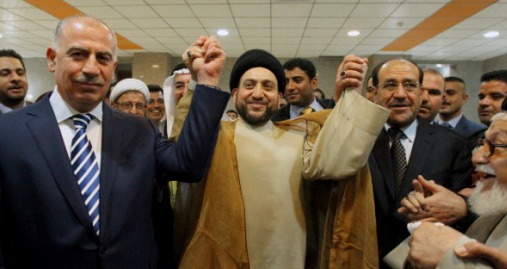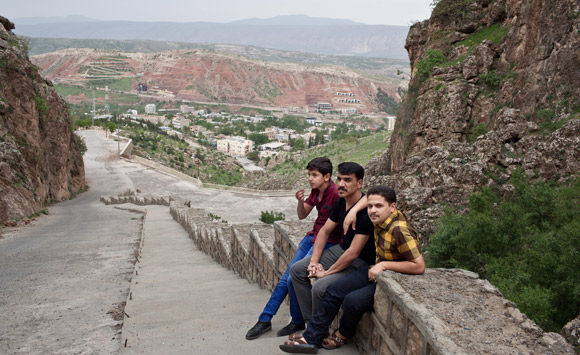Iraqi Pm’s Talk of Majority Govt Will Come to Nothing – And It’s His Own Fault!
Niqash | Baghdad

The Iraqi Prime Minister, Nouri al-Maliki, has been talking about the need for a majority government because consensus politics makes getting things done impossible. But thanks to his past behaviour – where he has sidelined Parliament, effectively making any opposition powerless – he may have fallen into a trap of his own making. Nobody wants a majority government because nobody wants to be part of the powerless political opposition.
There is no opposition movement in Iraqi politics. Instead all the major voting blocs have been part of the government. And it is this form of consensus politics that is causing so many problems in Iraq.
Since the 2003 US-led invasion of Iraq, that toppled the regime of Iraqi leader Saddam Hussein, political deadlocks in Iraq have been broken by parcelling out power equally to the three major groups in Iraqi politics. Traditionally the position of Prime Minister has gone to the Shiite Muslim parties, the President’s seat to the Iraqi Kurdish and the Speaker of the House to Iraq’s Sunni Muslims.
Meanwhile, the Iraqi Constitution says that the country’s Parliament is actually the highest authority in the country. Parliament is supposed to choose the president and prime minster as well as appoint senior figures like judges, heads of independent bodies and military leaders. It is also supposed to hold all elected officials accountable.
And on paper at least, anyone in opposition could still make themselves heard through the power of a Parliament like that. However, after six years of Prime Minister Nouri al-Maliki being in power, the Iraqi Parliament seems to have lost a lot of its clout. Al-Maliki has marginalised the MPs within it, stolen its powers and ignored any decisions it has made.
Prime examples of this include al-Maliki ignoring repeated requests from Parliament to come and discuss security and other political conflicts. The Iraqi Constitution specifically says that members of Parliament may question the Prime Minister or other ministers or call them to account, if they think they are not doing their job properly.
“There have been more than ten requests sent by Parliament to al-Maliki’s office asking him to come to Parliament – but he has ignored them all,” admits one employee of the Iraqi Parliament who is involved in preparing the agendas for MPs’ sessions; the employee wished to remain anonymous because he was not supposed to comment on these matters and feared dismissal. “All of the requests were prepared in a way that was consistent with the Constitution. However al-Maliki’s office simply sent letters back saying that the Prime Minister was too busy to attend.”
In other cases, al-Maliki has simply accused the MPs who want to question him, of trying to overthrow his government. For instance, in April last year the Iraqi Parliament asked al-Maliki to come and discuss the deteriorating security situation in the country. Al-Maliki responded by going on television and announcing that he wouldn’t attend the special meeting; he also accused the MPs who signed the request of trying to overthrow the government and obstruct the political process.
Al-Maliki has also prevented other senior politicians from having to be questioned in Parliament. The questioning of any official by Parliament requires the Prime Minister’s approval and al-Maliki simply refused to approve the requests.
From mid-2012 onwards, Iraqi MPs tried several times to question Ali al-Adeeb, Iraq’s Minister of Higher Education, about alleged abuses of the law and his use of a sectarian policy in his office. However al-Maliki prevented him from being questioned in Parliament.
The same situation arose when Jassim Mohammed Jaafar, Iraq’s Minister of Youth and Sport, was asked to come to Parliament to be questioned. Both of these politicians are members of al-Maliki’s own coalition.
Al-Maliki has also managed to sideline the country’s Parliament in other ways – and in particular, by simply ignoring it. The Iraqi Constitution says that Parliament should approve the appointments of individuals like the members of Iraq’s highest court, ambassadors, the heads of the Iraqi army and intelligence services and members of the Cabinet. However al-Maliki has made most of these appointments himself.
“Parliament has been weakened over the last few years because MPs have been prevented from performing one of their most important jobs: Monitoring the work of the government and prime minister,” says Iraqi Kurdish MP, Shwan Mohammed Taha. “The government also ignores Parliament’s requests to question officials.”
And this is part of the reason that there is no real political opposition in the Iraqi government and why consensus politics rule – and cause so many problems. Everybody wants to be on the winning team because nobody listens to opposition MPs anyway.
Today al-Maliki has said more than once that he now favours a majority government because the system of consensus politics, where every party is allocated an important role, has not done the country any good. In Iraq’s last general elections, held at the end of April. al-Maliki’s bloc won over 90 seats, well ahead of his nearest rivals, and he has stressed the need for his party to form a government and leave other parties as opposition parties in Parliament.
There is some logic to his argument: Consensus politics has made getting things done a lot more difficult in Iraq as every decision involves much negotiation and discussion. However if all of al-Maliki’s opponents end up in opposition it is more than likely he will simply continue to ignore them, further eroding the country’s fragile political and social systems.
Additionally al-Maliki has another problem here: Because of the way he has treated Parliament over the past few years, nobody wants to be part of the opposition. Every party wants to be part of the Iraqi government because they know they have no power if they are not. This, some might say, could well be a trap of al-Maliki’s own making.




